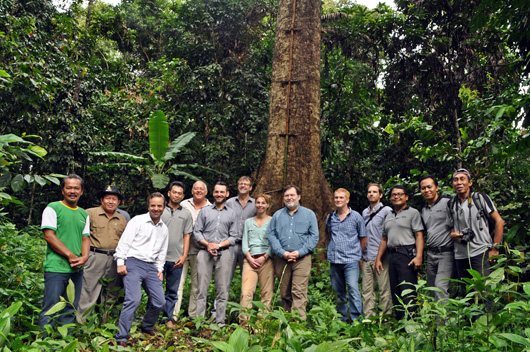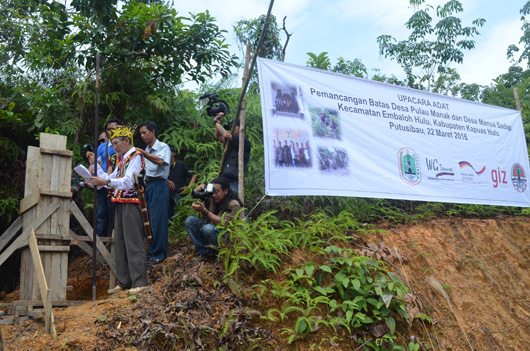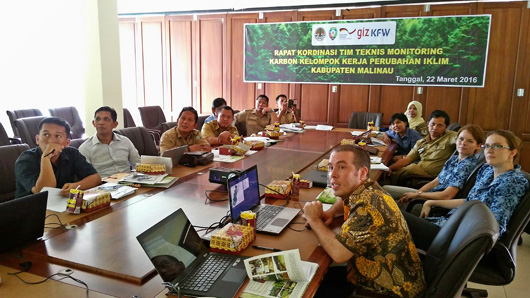FORCLIME
Forests and Climate Change ProgrammeTechnical Cooperation (TC Module)

Select your language

A delegation of the Ministry of Economic Cooperation and Development (BMZ) visited Kapuas Hulu on April 1st to 2nd. The delegation led by Mr. Thierry Kuehn of BMZ was warmly welcomed by the Head of Kapuas Hulu district, A.M. Nasir. Objective of the visit was to observe the implementation of the Forests and Climate Change Programme (FORCLIME) in Kapuas Hulu, and to strengthen the cooperation with the local government.
During his speech, the Regent of Kapuas Hulu, expressed his gratitude and appreciation for the ongoing program through FORCLIME. "As the program provides responsiveness to the local people surrounding forests, we appreciate it and will continue our support," he said. In addition, he also presented the potential of Kapuas Hulu and the ongoing development in the forest sector and beyond.
FORCLIME has implemented field activities in Kapuas Hulu, including support to the Forest Management Unit (FMU) development, investments for alternative livelihood development given directly to the communities, village participative mapping, conflicts mediation, development of Village Forest, introduction of the agroforestry system and enhancing capacities of communities to manage natural resources sustainably.
For further information, please contact:
Klothilde Sikun, District Coordinator of FORCLIME TC in Kapuas Hulu
Ali Mustofa, Adviser for Community Based Forest Management

On March, 22nd 2016, the two village communities Menua Sadap and Pulau Manak in Kapuas Hulu District celebrated the agreement over their administrative village boundaries by carrying out a special adat ceremony based on their customary traditions to symbolize the end of a long-standing boundary dispute. The event, where the first boundary demarcation was inaugurated, was organized in close collaboration with the sub-district government who had played an important facilitation role during the mediation process. The process that lead to this important milestone was further supported by the non-government organization Working Group Tenure (WGT), who guided the conflict mediation, as well as the Forests and Climate Change Program (FORCLIME). Key representatives from both the Ministry of Environment and Forestry, district governmental institutions as well as community leaders and members attended the ceremony and expressed their appreciation to all parties involved in finding the agreement.
Clear administrative boundaries are an important prerequisite for a village to receive government funds. Yet, due to overlapping customary historical land use claims between the Dayak Iban and the Dayak Embaloh ethnic groups, boundary demarcation could not be finalised in the past. Several mediation attempts had been made by civil society organisations before, but only now, with multi-stakeholder support from WGT, FORCLIME, the sub-district government, and of course the two communities themselves, a solution acceptable for all actors involved could be found. The mediation process was conducted in several stages such as: Joint assessment of the situation and establishment of a mediation team in each village; determination of the demographic and boundary status; participatory mapping of the areas with unclear status; discussion of mapping results among all relevant stakeholders and decision on final boundary outline; and at last the signing of the official agreement on village boundaries.
“We are very grateful that the village boundaries are set now, this makes the village administration complete”, stated Mr. Husin, Head of Menua Sadap village. The District Secretary of Kapuas Hulu reminded the participants of the event that “the village boundaries which have already been agreed upon must not be denied but jointly followed. If the village boundaries are not clear this will have a big influence on the availability of village funds.” He therefore stressed the “joint commitment” needed in order to “support the development success of each village.”
In a next step, the final village map is going to be officially handed over to the District Government. Furthermore, WGT and FORCLIME are currently discussing additional fields for collaboration with Kapuas Hulu District, including the establishment of a sub-national mechanism for conflict resolution. District stakeholders generally welcomed this initiative, as despite successful ways of addressing conflicts among customary adat communities, clear mechanisms to resolve conflicts that need to be handled beyond the village level still need to be established in Indonesia.
For more information, please contact:
Nina-Maria Gaiser, Junior Advisor GIZ FORCLIME, or Asep Firdaus, Advisor WGT

The Forestry Service of Malinau District conducted a coordination meeting with the district’s Climate Change Working Group on March 22. The meeting, which took place at the Malinau District Government office, was conducted in collaboration with FORCLIME Technical and Financial Cooperation. The objective of the meeting was to discuss the draft decree to establish a Technical Team for Monitoring, Reporting, and Verification (MRV) in the district. In addition, participants of the meeting also discussed the development strategy of the Regional Action Plan for Greenhouse Gas Reduction (RAD-GRK) for North Kalimantan Province. The meeting involved the Provincial Government of North Kalimantan, Malinau District Government, representatives of the Forest Management Unit (FMU) Malinau, as well as other organizations with activities in Malinau such as WWF, FORCLIME TC and FC.
As a result of the coordination meeting, it was agreed to establish a communication protocol between the district and provincial technical teams associated with the preparation of the RAD-GRK.
For further information, please contact:
Ali Mustofa, Technical Adviser, Community Based Forest Management (CBFM) ;
 |
Supported By: |
  |